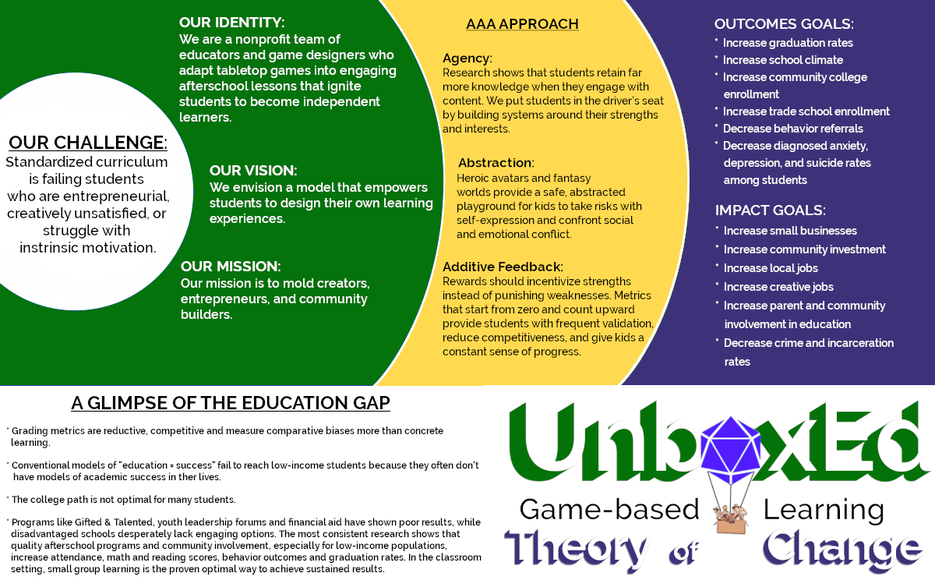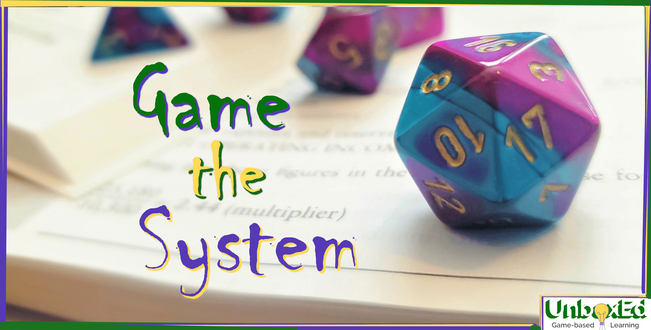Democratization of Rules
|
The open discussion – and agreement – of rules, culture, and expectations makes one feel as if his or her voice and ideas are valuable. This reinforces a team mentality and an intrinsic motivation to fulfill one’s responsibilities within a group.
|
Student Agency
|
Research shows that students retain far more knowledge when they engage with content that interests them. So why not put them in the driver’s seat and let them discover how education best serves them, by giving them the freedom and the resources to explore their passions.
|
Ownership
|
Many of our students are at an awkward stage of development: the time in life where they become aware that their parents, and adults in general, are flawed and vulnerable. Ownership is a major theme in their lives, as they begin their transition toward independence, which includes various efforts toward self-efficacy, agency, and identity. This is why kids adore tangible rewards and prizes. Anything to claim as their own. We are highly conscious of this developmental stage with our systems that guide students from these extrinsic incentives toward intrinsic incentives, to enjoy ownership of their passions, dreams and curiosities. We then extend this philosophy to the entire community, through our GroBlox initiative.
|
Mindfulness
|
In a word, presence. But in many words, Caverly Morgan explains how introducing mindfulness classes to public schools has contributed to student success. Tied to our belief that Social-Emotional Learning is the foundation of education, awareness, kindness, modesty, and self-reflection are not "soft skills." They are talents that require as much study and practice as any other discipline.
|
Evolving Reward Systems
|
Many disadvantaged students have fewer role models in their lives to demonstrate that education will lead to success. They require frequent and personalized feedback to pioneer their own model of success.
Rewards should incentivize a student’s individual strengths instead of punishing their weaknesses. In the game world, this is known as “min/maxing.” Simple methods such as positive language and additive scoring (metrics that start from zero and count upward) provide students with frequent validation, reduce competitiveness, and give students a sense of tangible progress. |
Creative Problem-Solving
|
Creativity opens up pathways to new forms of self-expression, empathy, and ways of relating to others. Creative thinkers value diverse ideas when approaching a challenge, but also have the confidence to defend their own.
|
Risk-taking
|
Often, the first step toward learning is failure. Any great accomplishment weathered a heap of failures. The goal is to eliminate the fear of failure. Risk-taking must be re-imagined as a necessity of creative problem-solving. Protecting students from failure results in an educational system designed for the lowest common denominator. We want students to fail often and fail better. In our view, wisdom does not come from experience; wisdom is earned from one’s response to experience.
|
Misogi
|
Taken from Japanese mythology, Misogi is a concept that elevates risk-taking to the next level. It is an endeavor that places a person in a challenging situation with a high degree of failure. Why? To return with two new mindsets: acknowledging that discomfort and failure aren't the end of the world; and aiming that resilience toward other aspects of his or her life, asking "How else am I limiting myself because of fear?"
|
Curiosity and Skepticism
|
Without skepticism, there is no science. Equally important to a student’s success is not only the knowledge to answer questions, but the delight in questioning answers. A healthy mistrust of information has never been more important. Communities need members who appreciate new information, but are vigilant enough to debate its motives, rationality and veracity. Don't believe everything you hear, or think.
|
Combinatorial Innovation
|
Huh?
Basically, it means communities leveraging their networks. With how isolating technology can be, we can’t forget to support social innovation. So-called “soft skills” will become more important and sought out as the world grows more automated. Interacting – not transacting – with each other, exchanging ideas and skills, and creating warm communities will be invaluable. Not to mention, humans learn better in social settings than remotely. Finding opportunities to be human in an increasingly robotic world will become an exercise in creativity. |
The Human Scale
|
Stolen unabashedly from Max Kenner and his Bard Prison Initiative, The Human Scale is the concept of quality over quantity applied to communication. We don't intend or aspire to solve the education system. We are offering our perspective to a cohort of unaddressed needs within our community. At any point that we grow too big for our britches and the relationship with any one student becomes affected by over-extending ourselves, we will choose quality over quantity.
|


